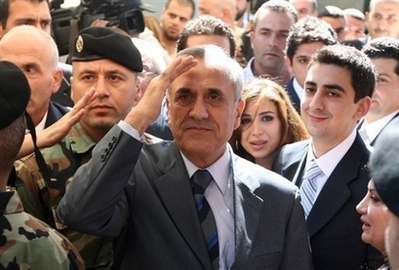Lebanon's new president Michel Sleiman appealed for unity after his election on Sunday, a move hailed as the start of a new era after a bitter political feud threatened to plunge the nation into civil war.

Lebanon's army chief Michel Sleiman (C) salutes people gathered at his family home in Feyyadieh, Beirut May 25, 2008. Sleiman appealed for unity after being sworn in following a parliament vote that many hope will turn a new page in the crisis-ridden nation. [Agencies]
"Let us unite... and work towards a solid reconciliation," the 59-year-old former army chief said after being sworn in following his election by parliament. "We have paid dearly for our national unity. Let us preserve it hand-in-hand."
Celebratory shots were fired into the air and fireworks lit up the sky as crowds of people, cheering and waving Lebanese flags, poured into the streets across Lebanon, including Beirut and Sleiman's hometown of Amsheet.
The election was welcomed by the international community led by US President George W. Bush who gave his staunch backing to the Sunni-led government in its 18-month standoff with the mainly Shiite Muslim Hezbollah-led opposition.
Sleiman was elected by 118 votes in a much-delayed parliament session attended by Arab and Western dignitaries that followed a deal hammered out Wednesday in Qatar between the rival Lebanese politicians.
"This is a historic moment," said parliament speaker and opposition stalwart Nabih Berri. "I ask God to help you succeed in steering the Lebanese ship to a safe haven... today no-one in the world can turn Lebanon into a killing field."
Sleiman's main challenge will be to impose himself as a neutral figure and reconcile the Western-backed ruling coalition and the opposition, which is supported by Iran and Syria.
After Sleiman was sworn in, the government of Prime Minister Fuad Siniora resigned in line with the constitution but will stay on in a caretaker role.